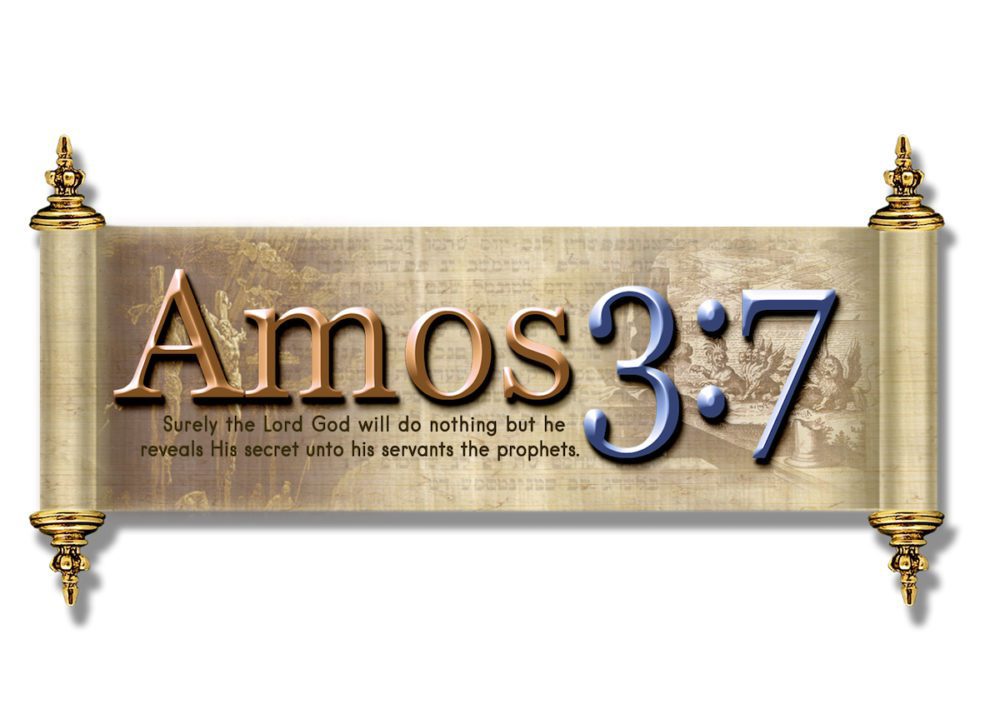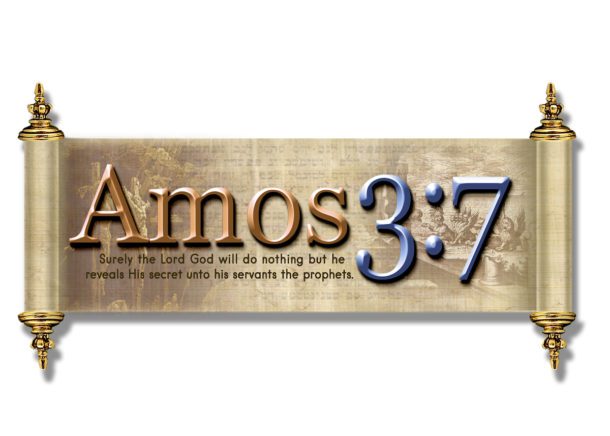“Moses stole the flood story from the Babylonians.” This year, many college freshmen will hear those words in lecture halls at universities across the nation. “Moses plagiarized an older flood story found in the Epic of Gilgamesh.” Many college freshmen, weak in their faith and unequipped to deal with these objections, will be shaken by the words from their professors, who then proclaim, “The Genesis flood is nothing but a myth, borrowed from an earlier Babylonian source.”
That argument is featured nowhere more prominently than in the book titled The Flood Myth, edited by Alan Dundes.1 We will address that argument in this article.2
Is the Genesis flood account (in Genesis 6–9) merely a borrowed story or a fictional tale lifted from a neighboring nation? The way we answer this question has massive implications for how we see the Bible, and therefore how we view God and even ourselves.
Either Moses is telling the truth, or Dundes and other secularists are telling the truth.
We have, therefore, two very different positions before us concerning the Genesis flood. Only one can be true. Either Moses (the author of Genesis) is telling the truth, or Dundes and other secularists are telling the truth. To put it another way, there is a myth in The Flood Myth. It is only a question of whether the myth-teller is the one quoted (Moses) or the ones doing the quoting.
The Discovery of the Epic of Gilgamesh
Alan Dundes (1934–2005) declared that, after 1872, it was no longer possible for creationists to claim that we possess the original record of the flood in Genesis.
Before 1872, it had been possible to assume that all the other, various, flood myths reported from different areas of the globe were simply derivative from the biblical narrative. With the discovery of earlier Near Eastern flood myths—from Babylonia, for example—which seemed to be cognate with the Genesis version, a new tack had to be taken by the literalists.3
What happened in 1872? An Assyriologist named George Smith published a translation of a large cuneiform tablet, found at the Library of Ashurbanipal in Nineveh. This tablet contained part of the Epic of Gilgamesh, an epic poem that dates earlier than the book of Genesis, and which contains an account of the flood with several specific similarities to Genesis.
In similar fashion, the anthropologist James George Frazer (1854–1941) proclaimed that for Christians who believe Genesis is true,
The difficulty has been greatly increased since modern research has proved the supposed divine original in Genesis to be not an original at all, but a comparatively late opy of a much older Babylonian or rather Sumerian version. No Christian apologist is likely to treat the Babylonian story, with its strongly polytheistic coloring, as a primitive revelation of God to man . . . And, if the theory of inspiration is inapplicable to the original, it can hardly be invoked to account for the copy.4
That is the claim made by Dundes, Frazer, and our other secularist friends, which we will now address.
Exposing Fallacious Reasoning
Is Dundes correct? Is Frazer correct, when he claims that modern research has “proved” that Genesis is not original at all, but a copy from the Babylonians?
Absolutely not. Our secular friends are very mistaken. There are several problems with their argument. I will list these problems now, and then we will discuss them further:
- This argument relies on the post hoc, ergo propter hoc fallacy (after this, therefore because of this). In making this assumption, they do not account for the possibility that there is a document which predates both Genesis and the Epic of Gilgamesh (or other Babylonian cognates), to which Moses (the author of Genesis) had access.
- They do not account for the fact that Moses lets us know he had sources.
- Genesis itself provides strong internal evidence of the sources of Moses’ writing: they are ancient sources from the patriarchs themselves, including Joseph, Jacob, Isaac, Abraham, and even Noah!
- This argument is contradicted by historical trends from the ancient Near East, which point to simpler accounts giving rise to more complex, embellished ones—rather than the reverse. This points to Genesis as containing the original account, and the Epic of Gilgamesh as a later account.
- This argument is contradicted by foreign flood traditions from across the world, which are ancient and original—yet they agree with Genesis rather than the Babylonian version.5 Specifically, these foreign traditions agree with Genesis, and not the Babylonian version, on several particular points such as the sending of birds, the reason for the flood, and the type and shape of floating vessel.
- Unlike the fictional Babylonian version, the Genesis account stands up to scrutiny, and finds confirmation from multiple fields of science such as geology, naval design, and paleontology. This attests to its authenticity. After all, a false testimony will fall apart under critical cross-examination, but a true testimony holds up.
What is the Epic of Gilgamesh?
What is the Epic of Gilgamesh? It is an ancient poetic work, fictional in nature, from a Babylonian source. This highly entertaining and dramatic story is about a strongman named Gilgamesh, who is two-thirds god and one-third man. Gilgamesh, after besting a rival demigod named Enkidu, develops a friendship with him. The two of them go on spirited adventures together, including fighting a fearsome forest monster called Humbaba. Later, his friend Enkidu falls under a curse and dies, and Gilgamesh becomes depressed at the loss of his friend. He then embarks on the “search for eternal life,” and travels across the sea to meet Uta-napishti. The latter tells Gilgamesh how he once survived the flood, and how the gods gave him immortality as his reward. This flood account toward the end of the epic is where we find several parallels with the Genesis account.
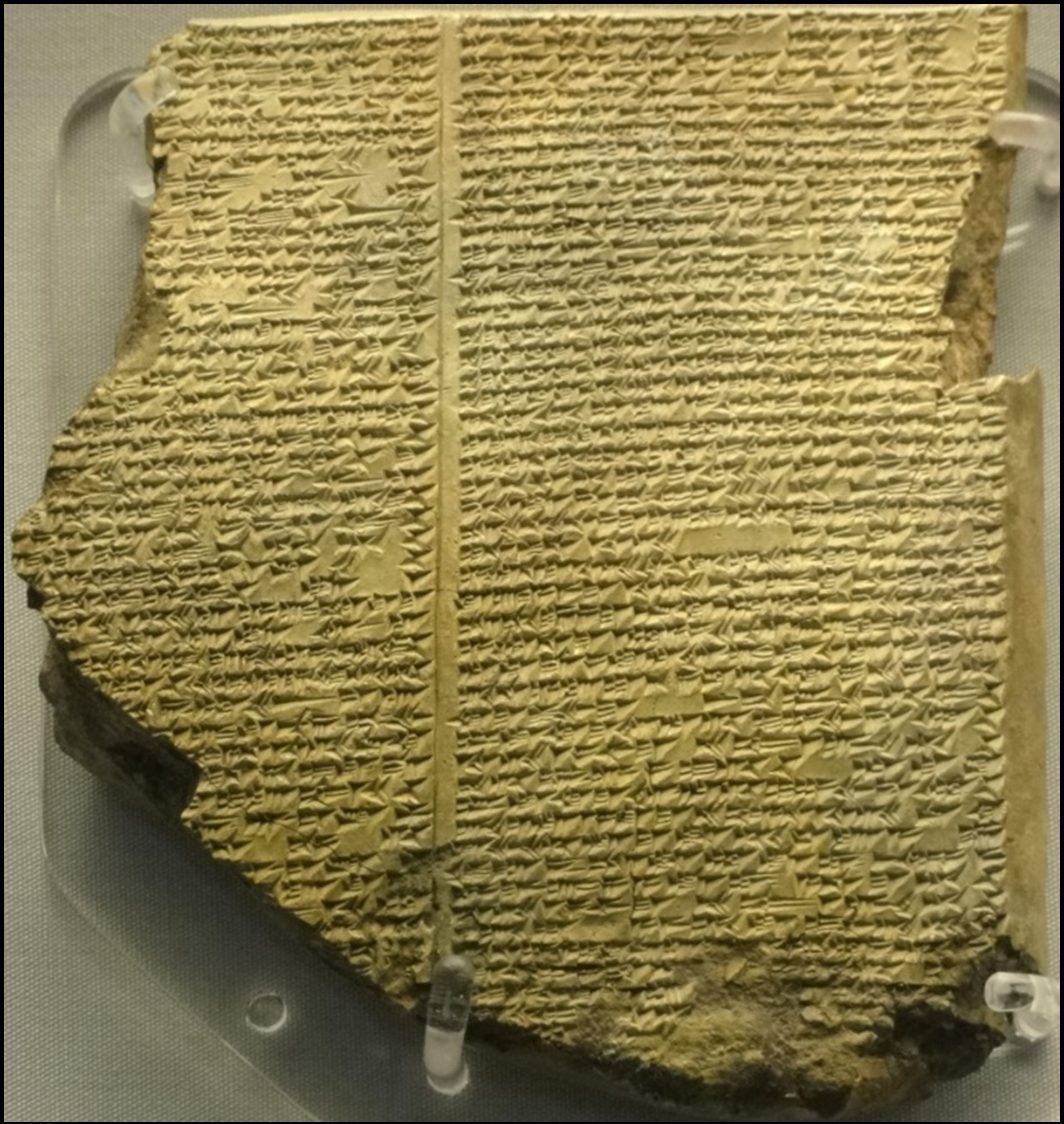
Clay Tablet Containing Part of the Epic of Gilgamesh.
Further Observations About the Epic
Now it is clearly and readily apparent, upon reading the Epic of Gilgamesh, that it is full of myth and fictional drama. That is not in question. Our secular friends heartily agree to this. They insist it is from this fictional source that the Genesis flood is derived.
To fully appreciate how fictional and embellished the epic is—particularly for those who have not read it—let’s take a moment and survey some examples that we find in the section about the flood:
- The gods said, “the uproar of mankind is intolerable and sleep is no longer possible by reason of the babel.” That is, they sent the flood to destroy mankind people they were too noisy, and the gods couldn’t sleep.6
- The flood is described in very figurative language. The storm clouds were so frightening that “even the gods were terrified . . . they flood to the highest heaven, the firmament of Anu; they crouched against the walls, cowering like curs [dogs].”7
- The “ark” of the epic was almost cube-shaped—120 cubits by 120 cubits, and seven decks in height (a very strange and instable design). And it was built in only three days.8
- The ship is complete with a captain and “tradesmen of every kind,” in addition to Uta-napishti and his family. And it is launched into the sea before the flood begins.9
- The landing of the ship is described in poetic terms, “One day she held, and a second day on the mountain of Nisir she held fast and did not budge. A third day, and a fourth day she held fast on the mountain and did not budge . . . “10
- After the flood, an argument ensued between the gods when they discovered that a remnant of mankind had escaped.11
- The gods “gathered like flies over the sacrifice,” pleased by the delicious smell of the animal sacrifice that Uta-Napisthi offered.12
- Uta-napishti and his wife were granted immortality and became gods as a reward for surviving the flood.13
- The whole flood narrative is full of dramatic, poetic, and emotional language.
Again, these examples are just from the epic’s flood account. Many more examples of myth could be multiplied from other sections of the epic.
The point is this: we can see that we are clearly dealing with a mythical, fictional work.
The Genesis Flood Account
Now let’s compare the epic’s obvious myth and embellishment with Genesis chapters 6 through 9.
At this point, I encourage you to pick up a Bible and read this section. What you will find is that the Genesis flood account is amazingly simple, sober, and matter-of-fact. Yet it is detailed, with records of the exact calendar days when certain milestones occurred, detailed descriptions, and even measurements of the depth of water!
In the second month, on the seventeenth day of the month, on the same day all the fountains of the great deep burst open, and the floodgates of the sky were opened. The rain fell upon the earth for forty days and forty night. (Genesis 7:11–12 NASB 1995)
In the seventh month, on the seventeenth day of the month, the ark rested upon the mountains of Ararat. The water decreased steadily until the tenth month; in the tenth month, on the first day of the month, the tops of the mountains became visible. (Genesis 8:4–5 NASB 1995)
Now it came about in the six hundred and first year, in the first month, on the first of the month, the water was dried up from the earth. Then Noah removed the covering of the ark, and looked, and behold, the surface of the ground was dried up. In the second month, on the twenty-seventh day of the month, the earth was dry. (Genesis 8:13–14 NASB 1995).
The Genesis flood account gives the distinct impression of seriousness and credibility. It also reads like it is a journal written by Noah himself.
Whether you believe it or not is a separate question. But the character of the document is that it is simple, serious, and matter-of-fact, with a detailed and orderly record of events. The character is that of a journal.
Which Came First?
So here are the facts: We have a Genesis account which is sober, simple, and sounds historical, and the Epic of Gilgamesh which is poetic, full of myth, drama, and embellishment. Read the two for yourself, and that is what you will find.
Now then, the question is this: which came first? Consider the insightful words of Kenneth Kitchen, a widely respected ancient Near East scholar and Egyptologist, who wrote:
The common assumption that the Hebrew account is simply a purged and simplified version of the Babylonian legend (applied also to the Flood stories) is fallacious on methodological grounds. In the Ancient Near East, the rule is that simple accounts or traditions may give rise (by accretion and embellishment) to elaborate legends, but not vice versa. In the Ancient Orient, legends were not simplified or turned into pseudo-history (historicized) as has been assumed for early Genesis.14
In evidence of this, Kenneth Kitchen cites as examples the legend of Sesotris in Egypt, progressive exaggerations in later traditions about the Hyksos kings of Egypt, the growth of traditions about Gilgamesh king of Uruk, and Enuma Elish.15
To put it in simpler terms, the rule we find is that historical accounts may give rise to legends, but legends do not give rise to history.16 This clearly points to the Genesis account as the original, authentic version.
Think about that for a moment. We are being told by our secular friends that the Babylonian version is the source of the Genesis text. Yet the former is full of myth and embellishment, whereas Genesis is simple and sounds historical. And we have the clear testimony of history, both generally and in the ancient Near East specifically, which tells us that history may give rise to legends, but legends do not give rise to history. There is a “directionality” to myth. It goes in one direction. That direction is from simple accounts to embellished legends. This unmistakably points to Genesis as containing the original, and the epic a later derivative!
Dundes, Frazer, and their modern counterparts should know this. If it were any other document, I believe they would have no trouble telling us which one is more original and which one is a later development. Why do they fail when it comes to Genesis? I fear there can be only one reason: because of anti-biblical bias.
The Epic of Gilgamesh fares very poorly when we compare it with flood traditions from other parts of the world, which agree with Genesis and not the Babylonian version.
The Testimony of Flood Traditions from Foreign Nations
Now, you may ask, are there any other lines of evidence that would identify which account is more ancient? Yes, there certainly are. First, let us consider the testimony of hundreds of tribes and nations around the world who have traditions of an ancient global flood. The question we will ask is this: Do these other traditions agree more with Genesis or with the Babylonian account? After all, the two differ on many important points. For example, the sending of birds after the flood is very different in Genesis and the epic. Likewise, the reason the flood was sent is very different. The type and shape of the floating vessel are very different. The one they agree with should represent the older, more original one.
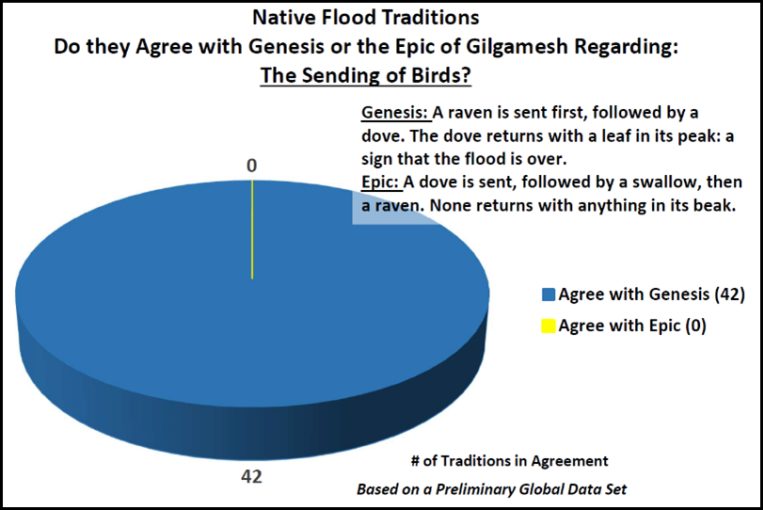
The results are in. The comparison has been done. These foreign flood traditions agree with Genesis, and not the Epic of Gilgamesh. Let me be clear: they agree universally with Genesis. Not one tradition agrees with the epic over against Genesis. Whenever these tribes say something touching on these areas of difference, they agree with Genesis and not the epic:
- The account of birds: 42 to 0 in favor of Genesis
- The reason the flood was sent: 91 to 0 in favor of Genesis
- The shape of the floating vessel: 83 to 0 in favor of Genesis
Wherever the epic differs from Genesis, it does so alone, without support from other tribal traditions.
That is the exact thing we should expect if Genesis is true. But it is the last thing we should expect if the secular view is true.
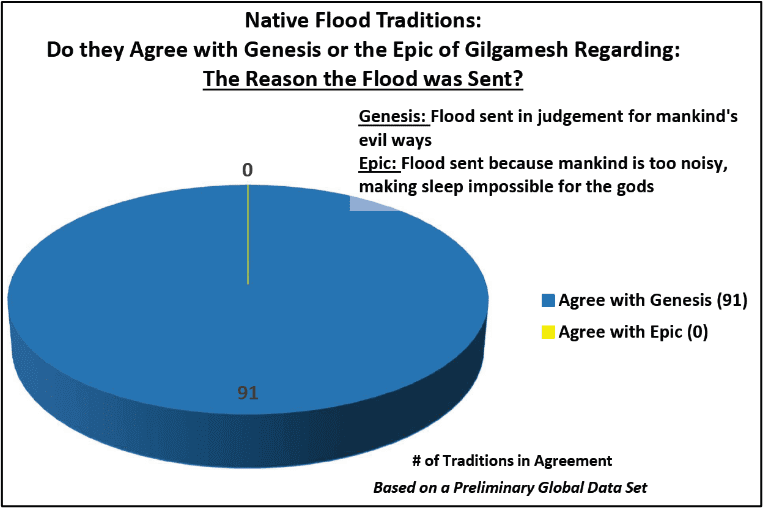
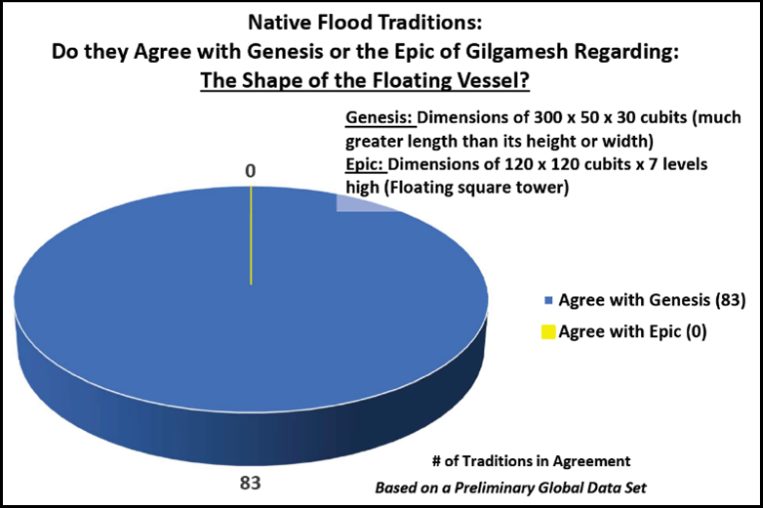
But Didn’t Moses Plagiarize?
But wait, wasn’t the Epic of Gilgamesh written several hundred years earlier than Genesis? Doesn’t that prove—as Dundes and Frazer claimed—that Moses borrowed from the epic? Doesn’t that prove that Moses copied the flood story from the Babylonians?
Wherever the epic differs from Genesis, it does so alone, without support from other tribal traditions.
Absolutely not. Dundes and Frazer are committing the fallacy of post hoc, ergo propter hoc (before this, therefore because of this).
But there’s more to it than that. After all, I would not imply that our secular friends are unaware of the post hoc, ergo propter hoc fallacy. They are well-educated. They are well aware of this logical fallacy and its dangers.
The problem is this: they are borrowing a hidden premise. They are borrowing the idea that Moses claims he is not using sources. They borrowed that idea from somewhere, but not from the Bible, for it is not found there.
Think about that for a moment! They say Moses is borrowing. They are borrowing. They are doing the very thing of which they falsely accuse Moses. For this reason, I consider it a hypocritical argument. They are borrowing an unwarranted assumption—the assumption that Moses pretended he didn’t have any sources.
Let’s unpack this further. Do you remember the time the Sadducees tested Jesus with a riddle—a logic puzzle? They put before him the case of a woman who had been married to seven different men, one after another. “Whose wife will she be in the resurrection, since she had been married to all of them?”
Do you remember how Jesus answered them? He answered their logic puzzle with Scripture, exposing their faulty reasoning: “Have you not read in the book of Moses?” As he explained the meaning of the Scripture to them, he said, “Is this not the reason you are mistaken, that you do not understand the Scriptures or the power of God?” (Mark 12:24, 26 NASB 1995)
Jesus exposed to them that they had a starting assumption, or premise, which was unfounded in Scripture. Therefore, they were arriving at false conclusions, because their reasonings weren’t founded in Scripture. Jesus took great issue with both the Pharisees and Sadducees: they had built entire philosophies and traditions upon assumptions that were unsound, unscriptural, and ultimately immoral!
They say Moses is borrowing. They are borrowing. They are doing the very thing of which they falsely accuse Moses.
You have got to start with what God’s Word says! Likewise, if you have a question about Scripture, you have to be willing to listen to Scripture’s answer. If you want to criticize Scripture, you have to listen to what Scripture says. You cannot criticize Scripture based on an inaccurate understanding of Scripture. You cannot criticize Moses based on false presuppositions about Moses. As Jesus said to some of his objectors, “‘I am not the one who accuses you. The one who accuses you is Moses.’” (John 5:45).
Today, I can almost hear Jesus asking our secular anthropologists, liberal theologians, and other friends a similar question, “Have you not read Genesis, where Moses says, ‘This is the book of the generations of Adam?’” (Genesis 5:1) If Moses refers to a book, why do you say he had no book?17
You cannot criticize Moses based on false presuppositions about Moses.
Have you not read in Numbers 21:14 (the fourth book of Moses), where Moses cites a “Book of the Wars of the Lord”? If Moses cites a book, why do you say he had no book?
Why do you claim for Moses something that he doesn’t claim for himself?
Have you not read the 11 places in Genesis where Moses uses the Hebrew word toledot, which means genealogy or family record? He proceeds to cite genealogies and family records. If Moses cites records, why do you say he had no record?
No, seriously, why are our secular friends claiming that Moses pretended he didn’t have sources? How can they defend that? They cannot. At best, it is based on ignorance of Scripture. At worst, it is disingenuous. In either case, they are trying to paint Moses into a corner. They are trying to take a book out of Moses’s hand, so that they can put another book in his hand (the Epic of Gilgamesh). They are trying to shut him off from all historical resources, so that they can make him dependent on a Babylonian myth. The whole argument is an unhistorical farce, and it needs to be abandoned immediately.
They are trying to take a book out of Moses’s hand, so that they can put another book in his hand (the Epic of Gilgamesh). The whole argument is an unhistorical farce, and it needs to be abandoned immediately.
Sources from the Patriarchs, Including Noah
The truth is, Moses had access to ancient written sources, passed down by none other than Noah, Abraham, and the patriarchs themselves. How do we know this? From a great deal of internal evidence found in Genesis. This fact alone is sufficient to annihilate the notion of dependence on Babylonian texts. Moses used these patriarchal sources, under the divine inspiration of God, in writing holy and inerrant Scripture.18
On another occasion, we could survey the wide array of evidence that Moses’ sources were from the patriarchs themselves. I address this more at length in Echoes of Ararat. In addition to Genesis 5:1 and the 11 toledot statements in Genesis, the level of detail in Genesis—unnecessary detail, if Moses were “making it up”—which includes genealogies, lists of kings and chiefs, records of transaction amounts, detailed accounts of events, and more, only makes sense if we are dealing with eyewitness records and family memoirs.
This fact alone (that Moses had access to ancient sources from the patriarchs such as Noah, Abraham, and Joseph) is sufficient to annihilate the notion of dependence on Babylonian texts.
Events in Genesis are told in a peculiar way that only the direct participants would have told them. We find highly personal, emotive accounts narrated in a way that only Joseph, Isaac, Jacob, and other patriarchs would have told them. For example, we read in Genesis 50:23 that Joseph, when he was very old, his great-grandchildren (the children of Machir, son of Manasseh) were born on his knees, and that he got to see his great-great-grandchildren (his son Ephraim’s great-grandchildren).
Why are these details in there? I submit to you that the form of Genesis only makes sense if we are dealing with family memoirs and ancient records from the patriarchs. Records which predate the Epic of Gilgamesh and other Babylonian cognates. Records which find vast confirmation from historical and archaeological evidence as well.19
Genesis is divinely inspired. It is God-breathed. Ironically, it is the humanity of Genesis that provides one of the best witnesses to its genuineness and historical reliability.
Genesis is divinely inspired. It is God-breathed. Ironically, it is the humanity of Genesis that provides one of the best witnesses to its genuineness and historical reliability.
Genesis Withstands Scrutiny and Finds Confirmation in Science
Another sign of the authenticity of the Genesis account is that it withstands scrutiny and finds confirmation from multiple fields of science.
These flood legends reflect a memory of the great flood, but the account in Genesis is the autograph.
First of all, the Genesis flood account truly stands out as the most historical, most trustworthy version to be found anywhere in the world. The Genesis flood text (chapters 6 through 9) is impressive in its sober, orderly, detailed account. It is truly superior to all of the flood legends that we find across the world, as amazing as many of those flood legends are. These flood legends reflect a memory of the great flood, but the account in Genesis is the autograph.
Second, let me call your attention to a very interesting pattern about flood legends: They localize the mountain where the ark landed. They say it was at some local mountain—Mount Rainier, Mount Denali, Mount Parnassus, some high mountain in the Himalayas, or some other local mountain.
Not so with Genesis. It would have been very convenient for the Jewish people to say that the ark landed at their greatest mountain, Mount Hermon. It says no such thing. It says the ark landed in “Ararat,” located several hundred miles away, likely in Turkey.
That location is not the location you would pick if you were “making it up.” It is inconvenient to place it outside of the nation of Israel. But that speaks to the great integrity with which the Jewish scribes carefully preserved the historical record.
Third, Genesis also records some rather embarrassing details about Noah after the flood (see Genesis 9:20–23), showing us his human flaws. This is not the sort of thing you include if you are “making it up.” That is very different from the embellishment that characterizes both the Babylonian epic and global flood legends. The epic says that Uta-napishti and his wife, as their reward for surviving the flood, were granted immortality and became gods.
Fourth, consider the dimensions of Noah’s ark: 300 cubits long by 50 cubits wide by 30 cubits high (a cubit is about 1.5 feet). Did you know that these dimensions have been tested by naval and hydraulic engineers, and they have been found to be the perfect dimensions for stability?20 These dimensions gave the ark supreme stability even in the face of very powerful waves, which raged upon the earth during the flood.
Now that is an amazing coincidence. Did Moses just make a “lucky guess,” which happened to be the optimal dimensions? No, he didn’t guess. He didn’t make it up. The internal evidence of Genesis indicates Moses had Noah’s journal, with the dimensions given to Noah by God.
The Epic of Gilgamesh, by contrast, fails miserably in regard to the dimensions of the vessel. It gives dimensions of 120 cubits by 120 cubits, and seven decks high. This vessel, like the epic itself, cannot be taken seriously. Such dimensions provide zero stability.
Fifth, geology actually confirms the flood. You won’t be taught this in school, but the fact is the geologic record gives unequivocal, multi-faceted testimony confirming the flood.The scriptural statement that “all the fountains of the great deep burst open” (Genesis 7:11 NASB 1995) matches what can be seen all along the ocean floor, with these enormous mid-ocean ridges at tectonic plate boundaries encircling the globe. Plate tectonic forces were at work on a catastrophic scale during the flood. Plate tectonics were unknown before the 20th century, but Genesis knew about them.
We are also finding that the chronology of the flood, as recorded in Genesis 7–8, fits extraordinarily well with the fossil record and the geologic record. But on this point, I will refer you to the work of our excellent creationist geological and Bible scholars.21
In short, we have strong historical and scientific grounds to trust the Genesis flood account. In a court of law, the testimony of a false witness will be shredded apart in cross-examination. However, the testimony of a true witness stands up to cross-examination. The Genesis record stands up. Not only does it stand up, but it seems to be prophetically accurate, offering positive predictive value, as many of our creationist geologists are finding.
Conclusion
Many of our college professors and teachers are trying to break the faith of Christian students by telling them that Moses stole from the Epic of Gilgamesh. But it is they who need to be taught that their argument is fallacious on methodological grounds, contradicted by historical insights from the ancient Near East, contradicted by comparative study of flood traditions, and contradicted by the internal evidence of the two texts. An examination of this question confirms the truth, historicity, and authority of the Genesis record (see Table 1).
| Data Point | Position | |
|---|---|---|
| Genesis flood account is historically reliable and original, not dependent on Babylonian texts, but Moses had access to ancient sources passed down by the patriarchs | Genesis flood account is not original and is dependent on the mythical Epic of Gilgamesh (or other Babylonian cognates) | |
| Epic of Gilgamesh predates Genesis by a few hundred years | ||
| Historical considerations/directionality of myth (in the ancient Near East, the rule is that simple accounts may give rise to elaborate legends, but not vice versa) | ||
| Where Genesis and the epic differ, aboriginal flood traditions from other parts of world invariably agree with Genesis, not the epic | ||
| Vast theological, worldview, and other textual differences pose enormous obstacles to Moses borrowing from the Babylonians | ||
| Genesis is the more sober, simple, historical-sounding, credible account | ||
| A wide array of internal evidence attests to the authenticity and reliability of Genesis | N/A | |
| Genesis withstands cross-examination and finds confirmation from scientific investigation | ||
| Verdict: The Genesis flood account is historically reliable and original, and is not dependent on the Epic of Gilgamesh or other Babylonian cognates. Rather, Moses had access to ancient sources passed down by the patriarchs. | ||
